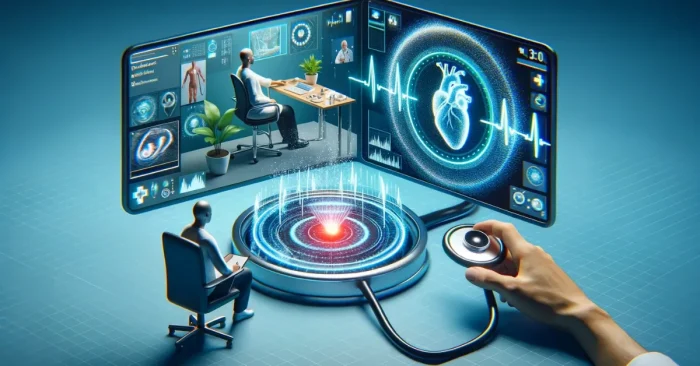Overview
AI tools for heart rate monitoring are revolutionizing cardiovascular health by enabling real-time tracking, predictive analysis, and personalized insights. These tools use artificial intelligence, machine learning, and sensor data from wearables, smartwatches, and medical devices to measure heart rate, detect irregularities, and provide actionable recommendations.
AI algorithms can identify patterns indicative of arrhythmias, stress, or other cardiovascular conditions, alerting users or healthcare providers promptly. By combining continuous monitoring with predictive analytics, these tools enhance early diagnosis, improve patient outcomes, and support preventive care. Widely used by consumers, athletes, and medical professionals, AI-powered heart rate monitoring tools offer precise, reliable, and personalized insights for maintaining optimal heart health and overall wellness.
1. Fitbit – AI Heart Rate Tracker
Fitbit leverages AI to track heart rate continuously using wearable sensors. AI algorithms analyze heart rate patterns, detect anomalies, and provide personalized health insights. The platform alerts users to irregular heart rhythms and helps monitor fitness levels. By using Fitbit, individuals can maintain cardiovascular health, track stress levels, and optimize workouts with AI-driven data.
2. Apple Watch – AI Health Monitoring
Apple Watch integrates AI to monitor heart rate and detect conditions such as atrial fibrillation. Its sensors collect real-time data, while AI algorithms analyze trends and generate health insights. Users receive alerts for abnormal readings, enabling early intervention. Apple Watch supports fitness tracking, stress management, and continuous heart health monitoring through AI-powered analytics.
3. Garmin – AI Heart Rate Analytics
Garmin wearables use AI to monitor heart rate, VO2 max, and training load. AI algorithms evaluate heart rate variability, detect irregularities, and provide personalized performance insights. Garmin helps athletes and fitness enthusiasts optimize workouts, track recovery, and maintain cardiovascular health through continuous AI-driven monitoring.
4. Polar – AI Smart Heart Rate Monitoring
Polar combines AI with wearable technology to track heart rate, sleep, and activity. AI algorithms analyze heart rate data to identify stress, fatigue, and exercise intensity. The platform offers personalized insights for performance improvement and overall wellness. By leveraging AI, Polar ensures accurate heart rate monitoring for fitness and health management.
5. Whoop – AI Performance Tracker
Whoop uses AI to monitor heart rate, heart rate variability, and recovery. Its AI algorithms provide actionable insights on strain, sleep, and performance. Users receive personalized recommendations to optimize training and recovery. Whoop’s AI-powered analysis helps athletes and health-conscious individuals maintain cardiovascular fitness and prevent overtraining.
6. Withings – AI Heart Health Monitoring
Withings integrates AI with wearable devices to track heart rate, detect arrhythmias, and monitor overall heart health. AI algorithms analyze trends, generate insights, and alert users to potential issues. The platform supports preventive care, lifestyle adjustments, and continuous heart rate monitoring for improved wellness.
7. BioSticker – AI Cardiac Monitoring
BioSticker uses AI-powered sensors to continuously monitor heart rate, respiration, and other vital signs. AI algorithms detect abnormalities, provide early alerts, and generate actionable insights for clinicians. BioSticker supports remote patient monitoring and enhances cardiac care through AI-driven predictive analytics.
8. Empatica Embrace – AI Heart Monitoring
Empatica Embrace combines AI and wearable technology to track heart rate and detect stress or irregularities. AI algorithms analyze physiological data and provide alerts for unusual patterns. The platform supports medical research, personal health monitoring, and preventive care by leveraging AI for accurate and continuous heart rate tracking.
9. AliveCor Kardia – AI ECG and Heart Rate
AliveCor Kardia uses AI to monitor heart rate and record ECG readings. AI algorithms detect arrhythmias, atrial fibrillation, and other abnormalities, providing real-time feedback. The platform enables early diagnosis, remote monitoring, and improved patient outcomes. AliveCor Kardia integrates AI-driven insights for both personal and clinical use.
10. Cardiogram – AI Heart Health App
Cardiogram leverages AI to analyze heart rate data from wearables, detecting early signs of cardiovascular disease. AI algorithms monitor heart rate variability, stress, and sleep patterns. The platform provides personalized insights, alerts users to irregularities, and helps optimize heart health. Cardiogram combines AI-driven analysis with user-friendly reporting for preventive cardiovascular care.
(FAQs)
Q1: How do AI tools improve heart rate monitoring?
AI tools analyze heart rate data in real-time, detect irregularities, predict potential issues, and provide personalized insights for optimized cardiovascular health and early intervention.
Q2: Are AI heart rate monitoring tools suitable for all users?
Yes, platforms like Fitbit, Apple Watch, and Garmin are suitable for individuals, athletes, and patients seeking continuous monitoring and heart health insights.
Q3: Can AI tools detect heart conditions early?
Absolutely, AI algorithms identify patterns indicative of arrhythmias, atrial fibrillation, and other cardiovascular issues, enabling timely alerts and preventive care.
Learn More About AI Course https://buhave.com/courses/learn/ai/






